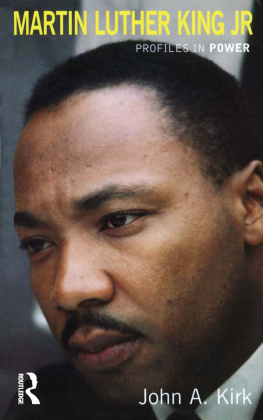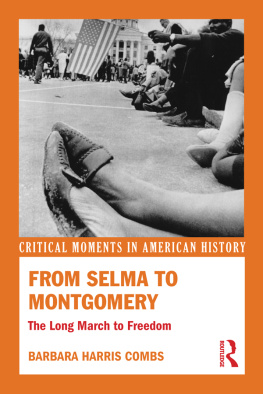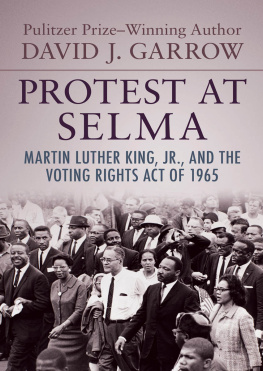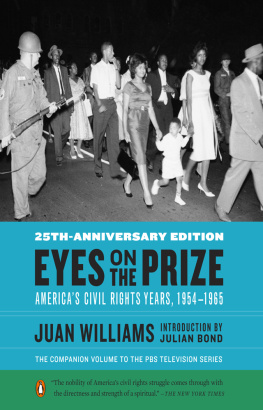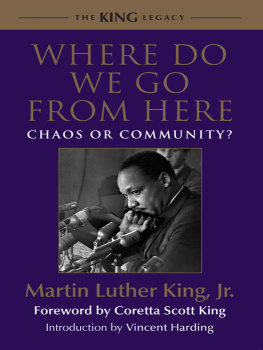The Chicago Freedom Movement is a wonderful and needed addition to the literature about this era in the citys and the countrys history. The compelling first-person narratives also remind us of the historical roots of todays activists in cities like Chicago, who continue the fight against racial and economic injustice.
Peter T. Alter, historian and director,
Studs Terkel Center for Oral History, Chicago History Museum
The Chicago Freedom Movement should be a handbook for present-day human rights activists. Through the eyes of a diverse group of seasoned civil rights leaders, it weaves a fabric that connects the actions and lessons of summer 1966, through decades of Chicago history, to inform reinvigorated grassroots movements today.
Philip Nyden, professor of sociology and director of the
Center for Research and Learning, Loyola University Chicago
The Chicago Freedom Movement brings together a unique collection of voices that help to shine a light on an important set of northern-based struggles and a powerful chapter in the larger movement history.
Barbara Ransby, historian and author of Ella Baker and the Black
Freedom Movement: A Radical Democratic Vision
The Chicago Freedom Movement is an exciting new treatment that explains the movement from a variety of points of view, including narratives from both historians and participants. The book presents voices and documentation in a fresh way that helps us to better understand the movements goals, successes, and failures, as well as its legacy for us today. Both scholars and general readers will gain new perspectives from this story.
Michael Honey, author of Going Down Jericho Road:
The Memphis Strike, Martin Luther Kings Last Campaign
This book makes a significant contribution to the understanding of the Chicago movement. It contains details about the Chicago Freedom Movement (tenant organizing, the North Shore project, the role of women, the role of nonviolence training with youth, the role of music, the lead poisoning campaign, etc.) that are usually left out or glossed over. Essential reading for historians, classrooms, and community activists.
Tracy E. KMeyer, author of Civil Rights in the Gateway
to the South: Louisville, Kentucky, 19451980
The Chicago Freedom Movement
THE
CHICAGO
FREEDOM
MOVEMENT
Martin Luther King Jr.
and Civil Rights Activism
in the North
Edited by
Mary Lou Finley, Bernard LaFayette Jr.,
James R. Ralph Jr., and Pam Smith
Foreword by Clayborne Carson

Due to variations in the technical specifications of different electronic
reading devices, some elements of this ebook may not appear
as they do in the print edition. Readers are encouraged
to experiment with user settings for optimum results.
Copyright 2016 by The University Press of Kentucky
Scholarly publisher for the Commonwealth,
serving Bellarmine University, Berea College, Centre College of Kentucky, Eastern Kentucky University, The Filson Historical Society, Georgetown College, Kentucky Historical Society, Kentucky State University, Morehead State University, Murray State University, Northern Kentucky University, Transylvania University, University of Kentucky, University of Louisville, and Western Kentucky University.
All rights reserved.
Editorial and Sales Offices: The University Press of Kentucky
663 South Limestone Street, Lexington, Kentucky 40508-4008
www.kentuckypress.com
Library of Congress Cataloging-in-Publication Data
Names: Finley, Mary Lou, 1943- editor. | LaFayette, Bernard, Jr., editor. |
Ralph, James R. (James Richard), 1960- editor. | Smith, Pam (Consultant), editor.
Title: The Chicago Freedom Movement : Martin Luther King Jr. and civil rights activism in the north / edited by Mary Lou Finley, Bernard LaFayette Jr.,
James R. Ralph Jr., and Pam Smith ; foreword by Clayborne Carson.
Description: Lexington, Kentucky : University Press of Kentucky, 2016. |
Series: Civil rights and the struggle for Black equality in the twentieth century | Includes bibliographical references and index.
Identifiers: LCCN 2015047420| ISBN 9780813166506 (hardcover : alk. paper) |
ISBN 9780813166520 (pdf) | ISBN 9780813166513 (epub)
Subjects: LCSH: African AmericansCivil
rightsIllinoisChicagoHistory20th century. | Civil rights
movementsIllinoisChicagoHistory20th century. | King, Martin
Luther, Jr., 1929-1968. | Chicago (Ill.)Race relations.
Classification: LCC F548.9.N4 C465 2016 | DDC 323.1196/073077311dc23
LC record available at http://lccn.loc.gov/2015047420
This book is printed on acid-free paper meeting the requirements of the American National Standard for Permanence in Paper for Printed Library Materials.

Manufactured in the United States of America.

| Member of the Association of American University Presses |
Contents
by Clayborne Carson
Mary Lou Finley, Bernard LaFayette Jr., James R. Ralph Jr., and Pam Smith
Edited by James R. Ralph Jr. and Mary Lou Finley
James R. Ralph Jr.
Christopher Robert Reed
Leonard S. Rubinowitz
Brian White
Gail Schechter
Herman Jenkins
Mary Lou Finley
Kimberlie Jackson
Jesse L. Jackson Sr.
Al Sharpton
Don Rose
Sherrilynn J. Bevel
Pam Smith
Jimmy Collier with Allegra Malone
Gene Barge with Allegra Malone
Molly Martindale
Hal Baron
Gil Cornfield, Melody Heaps, and Norman Hill
Bernard LaFayette Jr.
Mary Lou Finley
Jonathan Lewis
Photographs follow
Foreword
When Martin Luther King Jr. arrived in Chicago late in July 1965 to deliberate with leaders of the citys civil rights organizations, he realized that he was coming to the end of one stage of his life and commencing another. He was confident that Congress would soon pass the major new legislation that would become the Voting Rights Act. Along with the Civil Rights Act of 1964, this victory signaled a decisive triumph over the southern Jim Crow system of legalized racial segregation and discrimination. Although few Americans recognized it at the time, the Selma to Montgomery voting rights march would be the final sustained display of unified black-white protest in pursuit of national civil rights goals.
Because King was a visionary leader gifted with global and historical perspective, he recognized the enormous significance as well as the limitations of what had been achieved during the two decades following the end of World War II. Black Americans had overcome a viciously obdurate system of oppression, and elsewhere in the world more than fifty nations had freed themselves from colonialism. South African apartheid would endure for another quarter century, and other forms of invidious discrimination would persist even longer, but for the first time in history, a majority of humanity had gained basic constitutional rights in the nations where they resided.
Next page

